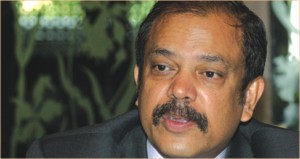 |
||
|
Business person of the year The game changer Refayet Ullah Mirdha
The outbreak of the Gulf War in the early 1990s ushered in an immense opportunity for Saiful Islam. He logged huge work orders mainly from international shipping agencies of Bangladesh, Hong Kong and Singapore. At the time, Islam, a merchant mariner by career, used to render technical services to ocean-going vessels from his Dhaka office. "In 1986, I willingly retired from my job at Bangladesh Shipping Corporation and opened a small office at Motijheel in Dhaka to offer technical services and sell spare parts to the owners of ocean-going ships. But the business was not doing well. I used to deliver services to clients under correspondence with my British and German expertise partners," he said. The moment of glory came to him when several ocean-going ship owners, mainly from Bangladesh, Hong Kong and Singapore, placed work orders with him, to render technical services to their ships stuck at different ports in the Gulf for several months due to the war. The repair works of the ships were due for months. Generally, ocean-going vessels need regular overhauling. The ships used to ferry through different ports in Europe, the Gulf, the Persian Gulf, Fareast regions, Hong Kong, Singapore, India and Bangladesh. "We offered technical services and earned a handsome amount that encouraged me to open up a new business," he said. Islam then invested in readymade garment and set up Al-Islam Apparel Group with a few friends in 1990. After Al-Islam Apparel Group kicked off, Islam sold his share in the garment business and moved on. He sought more value added businesses. In 1997, he established a German-Bangladesh joint venture, Picard (Bangladesh) Ltd, to produce leather goods for Germany's leading leather brand, Picard. He opened up the company with Tk 7 crore, and it is worth Tk 150 crore now, with average annual exports of $10 million. In 2000, he established Western Marine Shipyard Ltd in Chittagong to supply vessels to local buyers. From 2003 to 2007, he sold 55 ships. By 2007, his shipyard was made ready to build ocean-going ships for foreign buyers. Western Marine Shipyard, which spreads over 34 acres of land and is operated by 2,500 skilled workers and officials, earned $50 million in 2009 by exporting ocean-going vessels to Germany, Denmark and the Netherlands. Islam targets $100 million earning in the next two years and is setting up another yard in Chittagong. "Now the dock has a capacity to make 15,000 deadweight tonnage (DWT) ships. I plan to build 35,000 DWT ships within two years to achieve the $100 million export target," he said, adding that the new yard will have repairing facilities too. Western Marine grows at 30 percent a year, said Islam. Bangladeshi dry docks do not have repairing facilities now and so the country misses out on opportunities to earn huge foreign currencies. Islam said thousands of vessels come to Bangladesh and go to India, Sri Lanka, Singapore and Hong Kong for overhauling. His company also plans to go public this year to raise fund for expansion. "I will go for further diversification. I will buy or lease land in Munshiganj to cultivate jute, as the demand for jute and jute goods is rising globally," he said. Islam is the president of Bangladesh-German Chamber of Commerce and Industry, and Leather Goods and Footwear Manufacturers and Exporters Association of Bangladesh. He said seven more local companies are entering the shipbuilding business as Bangladesh has marked a spot in the international arena. "The shipbuilding industry will employ two lakh people in the next five years." Recently, he was awarded gold trophies for 2005-06 and 2007-08 for outstanding performance in export of leather goods. Primary education and primary health are a must, he said. He plans to set up a clinic at Karagaon, a village near the shipyard, to offer free health care services to the villagers, and to provide primary education to underprivileged children in the area.
|
||
